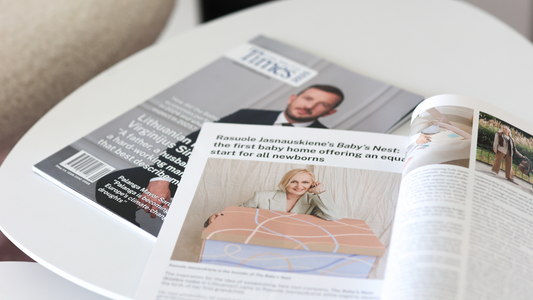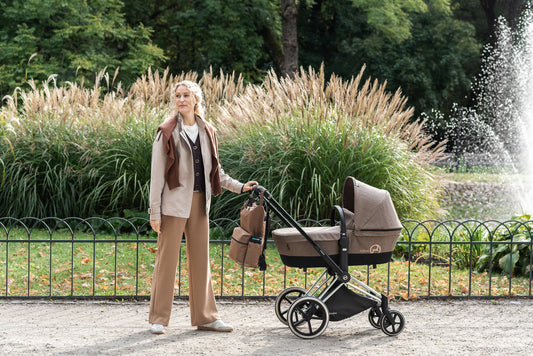When mothers finally see their 9-month-long awaited baby, they want to be with him as long as possible. Obstetricians and neonatologists, however, suggest sleeping apart, with the infant in a separate cot. Doctors are of the opinion that the baby should not be exposed to any hazards during the first few weeks of life and that the parents' bed is simply too soft for the infant. Every hospital ward has a cot, and at home, if parents haven't been able to purchase a cot yet, a box can help – it's a clean space with a mattress of the right firmness. By buying a box, parents are not only contributing to their own sleep, but also ensuring their baby's comfort.
Wanting to always be near your baby increases risk
Rūta Liutkevičienė, an obstetrician and gynaecologist at the Vilnius Maternity Home, says that women who have just given birth are often full of fears and uncertainty about how to care for their babies – in today's world, they can become perplexed by the advice coming from everywhere, including the internet.
The obstetrician-gynaecologist notices one common aspiration of all new moms – to be close to the baby as long as possible. This is understandable, but a newborn baby should be allowed to sleep independently from the very first day.
“I find it a bit strange to have a baby next to the mother – every postnatal ward does have cots. I don't know if it's the desire to be as close as possible, or if it's just harder to carry the baby to the cot if the birth was difficult. Keeping your baby close to you all the time will not make the bond stronger. And if a tired mother is sleeping right next to him... It's not safe at all– she might accidentally press him or just strike him with her arm. Although you may bring the cot closer to your bed, it's preferable to offer your child a secure space," the expert said.
She also mentions that it may be quite distressing for the parents when they eventually have to move the baby if it is still sleeping in the parent's bed when they get home.
“I have heard different opinions, but I think the most important argument in the debate is the safety of the baby,” said R. Liutkevičienė.
The ideal-sized box resembles the uterus
According to obstetrician-gynecologist Diana Ramašauskaitė, a newborn infant is put on the mother's chest immediately after birth. However, when you are in a postnatal ward, you should start using the cot there immediately.
“We normally advise that the infant sleeps in a newborn cot when we transfer a woman from the labour department to the ward where she will spend the next two to three days. Some women don't follow these recommendations,” she said.
D. Ramašauskaitė also stressed that this advice is is offered for safety reasons – mothers are usually exhausted after labour and may fall asleep unintentionally, or lay on their newborns.
“It's not unusual to discover babies in their moms' beds. If the mother doesn't sleep, maybe it's okay, but the baby at least should be on separate bedclothes, not laid directly in her bed", said D. Ramašauskaitė.
Vilma Jankauskienė, a paediatrician, discussed why infants require a compact setting and a firm mattress.
“Carried by his mother for nine months in a confined space, he is also more at ease in a smaller space after birth. Why a firmer mattress? Simply said, sudden infant death syndrome is more likely to occur on a softer bed. In addition, before the baby begins sitting, his spine is completely flat. Babies do not require pillows for this reason since their spines do not have the curvature that are formed when they sit, stand, or begin to walk, according to V. Jankauskienė.
The adult bed is simply too soft for them, which is another reason why physicians don't advise moms to sleep with a newborn. Secondly, babies are usually wet and sweaty in their parents' bed. Why?
They feel unwell and become "lost" in these beddings. It's undoubtedly not good. I advise just placing the Baby's Nest box in your bed if your infant is already restless and getting out of bed becomes too challenging for you. The infant will always be near but in his own little bed, therefore this is the best option, the paediatrician added.
Finnish approach: functionality and safety above aesthetics
Your baby doesn't require a blanket if he sleeps in a box since the ideal microclimate develops between the walls of a small box. The box is used for at least three months. V. Jankauskienė, a paediatrician, believes that later on, some kids may find it to be too confined for their needs.
“At four months old, the child is already beginning to turn on its side – and when he starts to move, the box becomes cramped,” she said.
Obstetrician-gynaecologist R. Liutkevičienė assessed the relatively new initiative in Lithuania – baby boxes, where a baby box for safe sleeping and all the baby's things and clothes are purchased at the same time, as a safe and cost-effective alternative to the cot.
"In order to save money, people frequently borrow cots from friends, but these cots may already be dangerous to use,” said R. Liutkevičienė. “These boxes have become very popular in Finland, where people care about safety and practicality. Well, Lithuanians are still concerned what other think of us, all those grandmothers and aunts.”
The only downside: "What if someone thinks about us wrong?"
R.Liutkevičienė also stressed that newborns are put to bed without pillows, lace or ribbons – save the embellishments for older age.
“The physiological curves of the spine in newborn babies still need to form. We are unsure about the safety of laces and other decorations because a newborn learns everything by placing it in his mouth. If the cot has drawstrings or ribbons, the child could have an accident while playing with them,” cautioned the obstetrician-gynaecologist.
Neonatologist and paediatric cardiologist Assist. Prof. Dr. Ramunė Vankevičienė was also pleased to note that when one family purchases a baby bedding set, another one – including a firm mattress and a waterproof sheet – is donated to a newborn child whose parents are unable to purchase a cot.
"Sleeping together is not forbidden. A newborn child does not, however, need to sleep with its mother. This desire develops later, when the infant realises who the mother is, when the psychological bond is established," the doctor said.
"The box is designed to be absolutely flawless. The only problem now is the attitude of our society," adds obstetrician-gynaecologist R. Liutkevičienė. "I have heard several young mothers saying: "I can imagine myself coming with this box to my mother-in-law..." “Why do we need pompastics, putting safety and pragmatism last?".



